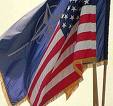Libya Occupied by the NATO Invaders

-If each strike delivered four bombs or missiles per run, more than 30,000 bombs would have levelled buildings, killed and maimed innocent Libyan men, women and children.
-Wars in Iraq, Afghanistan and now in Libya have introduced a new trend of embedded journalism. All reports by the embedded journalists are carefully vetted before going public.
-Qaddafi was held in higher esteem than, say, the Khalifa of Bahrain and its hated prime minister of forty years. The genuine public uprising, mainly by Bahrain’s seventy percent Shiites, was ruthlessly crushed while the rebellion in Libya was not only encouraged but actively supported by Nato air power.
The pulling down of Saddam Hussein’s statue in Baghdad in 2003 and Muammar Qaddafi’s in Tripoli in 2011 have a striking similarity: it was “angry people” who carried out the destruction in both cases. When imperial powers want to change regimes, they find a large number of “angry” people willing to cooperate with them against their own governments.
The invaders, however, have an excuse for invasion so that they can satisfy the people of their own countries. Afghanistan was invaded to “save America from terrorism and to protect American values and freedoms” abhorred by the Taliban. Iraq had to be occupied for the neutralisation of its alleged weapons of mass destructions. In Libya, the grounds for invasion are equally moral and humanitarian, not strategic or materialistic. It is not that the oil giants, Britain’s Shell and France’s Total, had been drooling over Libyan oil: it just happens that the country’s oil region is now effectively under the control of British and French troops.
Chris Cork’s piece “A country awakes” (Sept 6) has further elucidated how the Libyan people have won their freedom from a tyrant. He asserted that “Libyans fought the ground war themselves (albeit with some sturdy support from the coalition of the willing) and want to keep the soldiering a local enterprise.” Yes, the insurrection is a local venture, though it’s another matter that the MI6 boys had penetrated deep inside Libya to foment the uprising. It’s also another matter that foreign mercenaries were brought in to fight government forces.
In reality, Qaddafi’s government couldn’t have been brought down without the Nato bombing campaign led mainly by American, British and French air forces. About 20,000 sorties, with more than 7,500 strikes so far, have gone against ground targets in Libya, as reported by veteran Canadian journalist Patrick Martin in a recent despatch. If each strike delivered four bombs or missiles per run, more than 30,000 bombs would have levelled buildings, killed and maimed innocent Libyan men, women and children. This is what Chris Cork calls “some sturdy support from the coalition of the willing.”
It’s in place to quote an analysis by Britain’s Second Line of Defence (SLD) in its report about Operation Ellamy in Libya that confirms that “the UK’s pace of operations has been averaging £3-5 million per day on a gross basis. It brings running operational costs for weekly air operations to £20-35 million, and monthly to £80-140 million, bringing the cost of operations since March 19 to £300-525 million”– to mention only Britain. Some “local enterprise,” this.
The irony is that imperial powers never allow independent journalists to report from the war front. Wars in Iraq, Afghanistan and now in Libya have introduced a new trend of embedded journalism. All reports by the embedded journalists are carefully vetted before going public. Therefore, people in the US and Europe can only read what is intended for them. That is one reason why, according to a poll, almost thirty percent of Americans prefer to glean news and commentaries from alternative forums on the Internet than to depend on their mainstream media.
Among the countries that have contributed towards the Nato operations in Libya by providing aircraft and troops are Turkey, Jordan, Qatar and the UAE. Should the king of Jordan and the emirs of Qatar and the UAE not have questioned themselves what type of dictator they were trying to topple in Libya and how he was different from them? Qaddafi was held in higher esteem than, say, the Khalifa of Bahrain and its hated prime minister of forty years. The genuine public uprising, mainly by Bahrain’s seventy percent Shiites, was ruthlessly crushed while the rebellion in Libya was not only encouraged but actively supported by Nato air power.
Tailpiece: Mr Cork, how do you discriminate between Tony Blair’s claim about Saddam’s WMDs and David Cameron’s about Qaddafi killing his own people? Is it not intriguing that both Iraq and Libya overflow with high-quality oil?
The writer is a freelance columnist based in Lahore.
Stop NATO e-mail list home page with archives and search engine:
http://groups.yahoo.com/group/stopnato/messages
Stop NATO website and articles:
http://rickrozoff.wordpress.com

